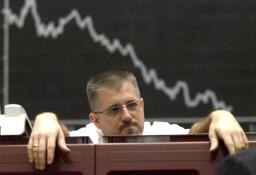Shares on the Milan stock exchange and elsewhere around the world took a nosedive on Monday despite the efforts of governments to instill investor confidence.
Milan's S&P/Mib index plummeted by more than 9% to below 24,000 points, its lowest level since the benchmark index measuring Milan's 40 most active shares was created in 2004 to take the place of the Mib30 blue chip index.
However, by closing the S&P/MIB reduced losses to 8.24%.
The Mibtel index, which measures all Italian and foreign shares listed in Milan, also sank 8.24% with numerous stocks suspended from trading for excessive losses.
Aside from bank and insurance stocks, the hardest hit by the recent global financial crunch, oil and energy stocks also took a beating on Monday as the price of crude oil fell below $90 and the euro slid against the dollar to its lowest since August of last year, less than $1.35.
Monday's bloodbath in Europe saw stocks down in London by 7.85%, in Frankfurt by 7.07% and in Zurich by 5.98%, while in Paris they plummeted by 9.04% - the biggest one-day drop since 1988.
A total of 444 billion euros were lost on European markets, with the pan-Euroepan DJ STOXX 600 index plunging 7.23%, the biggest single-day drop since 1987, to its lowest since November 2004.
New York opened on the downturn and keep falling with the Dow Jones index sinking 5% to below 1,000 points, the S&P index down by 5.78% and the Nasdaq index dropping 6.45%.
EU FAILS TO INSTILL CONFIDENCE.
Statements at the weekend from the four European Union members of the Group of Seven (G7) most industrialised countries - Italy, Germany, Britain and France - and by French President Nicholas Sarkozy on Monday that EU governments would do everything necessary to protect small investors failed to instill the market confidence needed to stem the European slide.
Italian Premier Silvio Berlusconi pre-empted Sarkozy to announce that all EU governments ''will take whatever measures necessary to maintain the stability of the financial system through the issuing of cash by their central banks, targeted actions on single banks, actions aimed at protecting deposits and through measures necessary to protect the system which ensure that individual small investors in our banks do not suffer any losses to their savings''.
Neither Berlusconi's statement nor the later confirmation by Sarkozy appeared to have any effect on trading.
EYES ON UNICREDIT.
The day began in Milan with all eyes on UniCredit after Italy's biggest bank announced at the weekend a 6.6-billion-euro emergency plan to boost its capital and ensure it has a 6.7% Tier I capital ratio at the end of the year.
The ratio is a measure of a bank's strength and 6% is considered the minimum, while UniCredit's ratio is currently calculated at 5.7%.
The market's initial reaction was to see UniCredit shares tumbling by more that 16% although by midday losses were reduced to just over 6% and the stock ended trading with a loss of 5.9%.
The morning's losses were in part due to the bank admitting that it had been forced to write down some 700 million euros in loans and bonds in the third quarter and that profits for the year would be 25% less than forecast.
This later resulted in S&P revising its outlook on UniCredit's long-term debt from stable to negative, while keeping the A+ rating.
The plan adopted by the UniCredit board included a series of cost-cutting measures and the sale of a number of assets including its 3.5% stake in the Generali insurance company, Treasury certificates, real estate holdings and branches of Capitalia - the former Banca di Roma which was absorbed by UniCredit last year.
UniCredit also said it would pay dividends next year with shares instead of cash and launch a three-billion-euro rights issue for existing shareholders.
In the event the rights issue does not meet its target, the bank's biggest shareholders said they were ready to buy convertible bonds to make up the difference.



